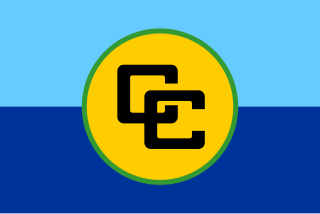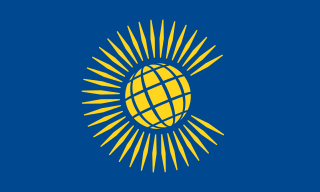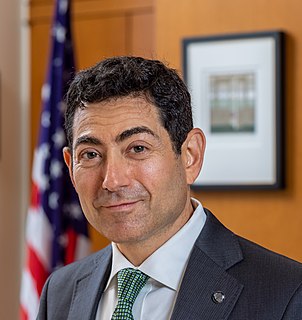Related Research Articles

The International Labour Organization (ILO) is a United Nations agency whose mandate is to advance social and economic justice through setting international labour standards. Founded in October 1919 under the League of Nations, it is the first and oldest specialised agency of the UN. The ILO has 187 member states: 186 out of 193 UN member states plus the Cook Islands. It is headquartered in Geneva, Switzerland, with around 40 field offices around the world, and employs some 3,381 staff across 107 nations, of whom 1,698 work in technical cooperation programmes and projects.

Since independence, with Jaja Wachuku as the first Minister for Foreign Affairs and Commonwealth Relations, later called External Affairs, Nigerian foreign policy has been characterised by a focus on Africa as a regional power and by attachment to several fundamental principles: African unity and independence; capability to exercise hegemonic influence in the region: peaceful settlement of disputes; non-alignment and non-intentional interference in the internal affairs of other nations; and regional economic cooperation and development. In carrying out these principles, Nigeria participates in the African Union, the Economic Community of West African States (ECOWAS), the Non-Aligned Movement, the Commonwealth of Nations, and the United Nations.

The World Council of Churches (WCC) is a worldwide Christian inter-church organization founded in 1948 to work for the cause of ecumenism. Its full members today include the Assyrian Church of the East, the Oriental Orthodox Churches, most jurisdictions of the Eastern Orthodox Church, the Old Catholic Church, the Lutheran Churches, the Anglican Communion, the Mennonite Churches, the Methodist Churches, the Moravian Church, Marthoma Syrian Church and the Reformed Churches, as well as the Baptist Churches and Pentecostal Churches. Notably, the Catholic Church is not a full member, although it sends delegates to meetings who have observer status. The WCC arose out of the ecumenical movement and has as its basis the following statement:
The World Council of Churches is a fellowship of churches which confess the Lord Jesus Christ as God and Savior according to the scriptures, and therefore seek to fulfill together their common calling to the glory of the one God: Father, Son and Holy Spirit.
It is a community of churches on the way to visible unity in one faith and one eucharistic fellowship, expressed in worship and in common life in Christ. It seeks to advance towards this unity, as Jesus prayed for his followers, "so that the world may believe".

The Caribbean Community is an intergovernmental organisation of 15 member states throughout the Caribbean having primary objectives to promote economic integration and cooperation among its members, to ensure that the benefits of integration are equitably shared, and to coordinate foreign policy. The organisation was established in 1973. Its major activities involve coordinating economic policies and development planning; devising and instituting special projects for the less-developed countries within its jurisdiction; operating as a regional single market for many of its members ; and handling regional trade disputes. The secretariat headquarters is in Georgetown, Guyana. CARICOM is an official United Nations Observer beneficiary.

Louise Bernice Arbour, is a Canadian lawyer, prosecutor and jurist.
The Commonwealth Parliamentary Association (CPA), previously known as the Empire Parliamentary Association, is an organisation which works to support good governance, democracy and human rights.
The Canadian Taxpayers Federation is a federally incorporated, non-profit organization in Canada. It claimed 30,517 donors and 215,009 supporters in 2018–19. Voting membership, however, is restricted to the board of directors. According to its by-laws, the board "can have as few as three and as many as 20" members. In 2017, it reportedly had a voting membership of six board members, and in 2020 it had four.
A law commission, law reform commission, or law revision commission is an independent body set up by a government to conduct law reform; that is, to consider the state of laws in a jurisdiction and make recommendations or proposals for legal changes or restructuring.
The American Council of Learned Societies (ACLS), founded in 1919, is a private, nonprofit federation of 75 scholarly organizations in the humanities and related social sciences. It is best known for its fellowship competitions which provide a range of opportunities for scholars in the humanities and related social sciences at all career stages, from graduate students to distinguished professors to independent scholars, working with a number of disciplines and methodologies in the U.S. and abroad.

Priests for Life (PFL) is a pro-life and anti-abortion organization based in Titusville, Florida. PFL functions as a network to promote and coordinate pro-life activism, especially among Roman Catholic priests and laymen, with the primary strategic goal of ending abortion and euthanasia and to spread the message of the Evangelium vitae encyclical, written by Pope John Paul II.
The Law Enforcement Action Partnership (LEAP), formerly Law Enforcement Against Prohibition, is a U.S.-based 501(c)(3) nonprofit group of current and former police, judges, prosecutors, and other criminal justice professionals who use their expertise to advance drug policy and criminal justice solutions that enhance public safety. The organization is modeled after Vietnam Veterans Against the War. As of April 2017, they have more than 180 representatives around the world who speak on behalf of over 5,000 law enforcement members and 100,000 supporters.
Regulation of acupuncture is done by governmental bodies to ensure safe practice.

The Commonwealth of Nations, generally known simply as the Commonwealth, is a political association of 54 member states, almost all of which are former territories of the British Empire. The chief institutions of the organisation are the Commonwealth Secretariat, which focuses on intergovernmental aspects, and the Commonwealth Foundation, which focuses on non-governmental relations amongst member states.
Higher education accreditation is a type of quality assurance process under which services and operations of post-secondary educational institutions or programs are evaluated to determine if applicable standards are met. If standards are met, accredited status is granted by the agency.

Mariano-Florentino "Tino" Cuéllar is the president of the Carnegie Endowment for International Peace. He is a former Justice of the Supreme Court of California, a scholar and academic leader, and a former official in the Clinton and Obama administrations. He is a scholar of administrative law and legislation, cyberlaw, international affairs and international law, public health and safety law, and institutions and organizations. He was previously the Stanley Morrison Professor of Law at Stanford Law School and the Director of Stanford's Freeman Spogli Institute for International Studies, and served as Co-Chair of the U.S. Department of Education's Equity and Excellence Commission. He was elected to the President and Fellows of Harvard College in February 2019.

Women in law describes the role played by women in the legal profession and related occupations, which includes lawyers, paralegals, prosecutors, judges, legal scholars, law professors and law school deans.
Cyberjustice is the incorporation of technology into the justice system, either through offering court services electronically or through the use of electronics within courtrooms or for other dispute resolution purposes. One of the most crucial goals of cyberjustice is increasing access to justice through both reducing the costs associated with administering justice as well as reducing the burden on the judges and the court system as a whole.
The Law Reform and Development Commission (LRDC) is a government commission established in 1992 in Namibia, that creates reports making recommendations for legal reforms. In 2014, New Era reported that the Ministry of Justice was not seriously following up on reports submitted as far back as 2003. The LRDC is an independent panel of experts from the government that is part of the Commonwealth Association of Law Reform Agencies.
References
- 1 2 COMMONWEALTH ASSOCIATION OF LAW REFORM AGENCIES” (15 March 2005). "ASSOCIATION OF LAW REFORM AGENCIES FOR EASTERN AND SOUTHERN AFRICA: LAW REFORM CONFERENCE: 15 to 17 March 2005" (PDF).
- ↑ "Conference of the Commonwealth Association of Law Reform Agencies (CALRAs) | British Columbia Law Institute". www.bcli.org. Retrieved 2017-04-09.
- ↑ Sayers, Michael (March 2015). A REPORT FROM THE COMMONWEALTH ASSOCIATION OF LAW REFORM AGENCIES (PDF) (Report).
- ↑ "Commonwealth Association of Law Reform Agencies (CALRAs)". www.calras.org. Archived from the original on 2017-04-10. Retrieved 2017-04-09.